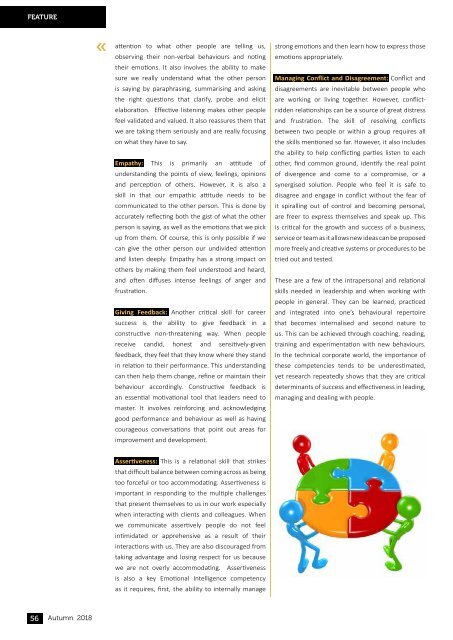THE ACCOUNTANT_AUTUMN_2018_VER-7-L
Create successful ePaper yourself
Turn your PDF publications into a flip-book with our unique Google optimized e-Paper software.
FEATURE<br />
attention to what other people are telling us,<br />
observing their non-verbal behaviours and noting<br />
their emotions. It also involves the ability to make<br />
sure we really understand what the other person<br />
is saying by paraphrasing, summarising and asking<br />
the right questions that clarify, probe and elicit<br />
elaboration. Effective listening makes other people<br />
feel validated and valued. It also reassures them that<br />
we are taking them seriously and are really focusing<br />
on what they have to say.<br />
Empathy: This is primarily an attitude of<br />
understanding the points of view, feelings, opinions<br />
and perception of others. However, it is also a<br />
skill in that our empathic attitude needs to be<br />
communicated to the other person. This is done by<br />
accurately reflecting both the gist of what the other<br />
person is saying, as well as the emotions that we pick<br />
up from them. Of course, this is only possible if we<br />
can give the other person our undivided attention<br />
and listen deeply. Empathy has a strong impact on<br />
others by making them feel understood and heard,<br />
and often diffuses intense feelings of anger and<br />
frustration.<br />
Giving Feedback: Another critical skill for career<br />
success is the ability to give feedback in a<br />
constructive non-threatening way. When people<br />
receive candid, honest and sensitively-given<br />
feedback, they feel that they know where they stand<br />
in relation to their performance. This understanding<br />
can then help them change, refine or maintain their<br />
behaviour accordingly. Constructive feedback is<br />
an essential motivational tool that leaders need to<br />
master. It involves reinforcing and acknowledging<br />
good performance and behaviour as well as having<br />
courageous conversations that point out areas for<br />
improvement and development.<br />
strong emotions and then learn how to express those<br />
emotions appropriately.<br />
Managing Conflict and Disagreement: Conflict and<br />
disagreements are inevitable between people who<br />
are working or living together. However, conflictridden<br />
relationships can be a source of great distress<br />
and frustration. The skill of resolving conflicts<br />
between two people or within a group requires all<br />
the skills mentioned so far. However, it also includes<br />
the ability to help conflicting parties listen to each<br />
other, find common ground, identify the real point<br />
of divergence and come to a compromise, or a<br />
synergised solution. People who feel it is safe to<br />
disagree and engage in conflict without the fear of<br />
it spiralling out of control and becoming personal,<br />
are freer to express themselves and speak up. This<br />
is critical for the growth and success of a business,<br />
service or team as it allows new ideas can be proposed<br />
more freely and creative systems or procedures to be<br />
tried out and tested.<br />
These are a few of the intrapersonal and relational<br />
skills needed in leadership and when working with<br />
people in general. They can be learned, practiced<br />
and integrated into one’s behavioural repertoire<br />
that becomes internalised and second nature to<br />
us. This can be achieved through coaching, reading,<br />
training and experimentation with new behaviours.<br />
In the technical corporate world, the importance of<br />
these competencies tends to be underestimated,<br />
yet research repeatedly shows that they are critical<br />
determinants of success and effectiveness in leading,<br />
managing and dealing with people.<br />
Assertiveness: This is a relational skill that strikes<br />
that difficult balance between coming across as being<br />
too forceful or too accommodating. Assertiveness is<br />
important in responding to the multiple challenges<br />
that present themselves to us in our work especially<br />
when interacting with clients and colleagues. When<br />
we communicate assertively people do not feel<br />
intimidated or apprehensive as a result of their<br />
interactions with us. They are also discouraged from<br />
taking advantage and losing respect for us because<br />
we are not overly accommodating. Assertiveness<br />
is also a key Emotional Intelligence competency<br />
as it requires, first, the ability to internally manage<br />
56 Autumn <strong>2018</strong>
















